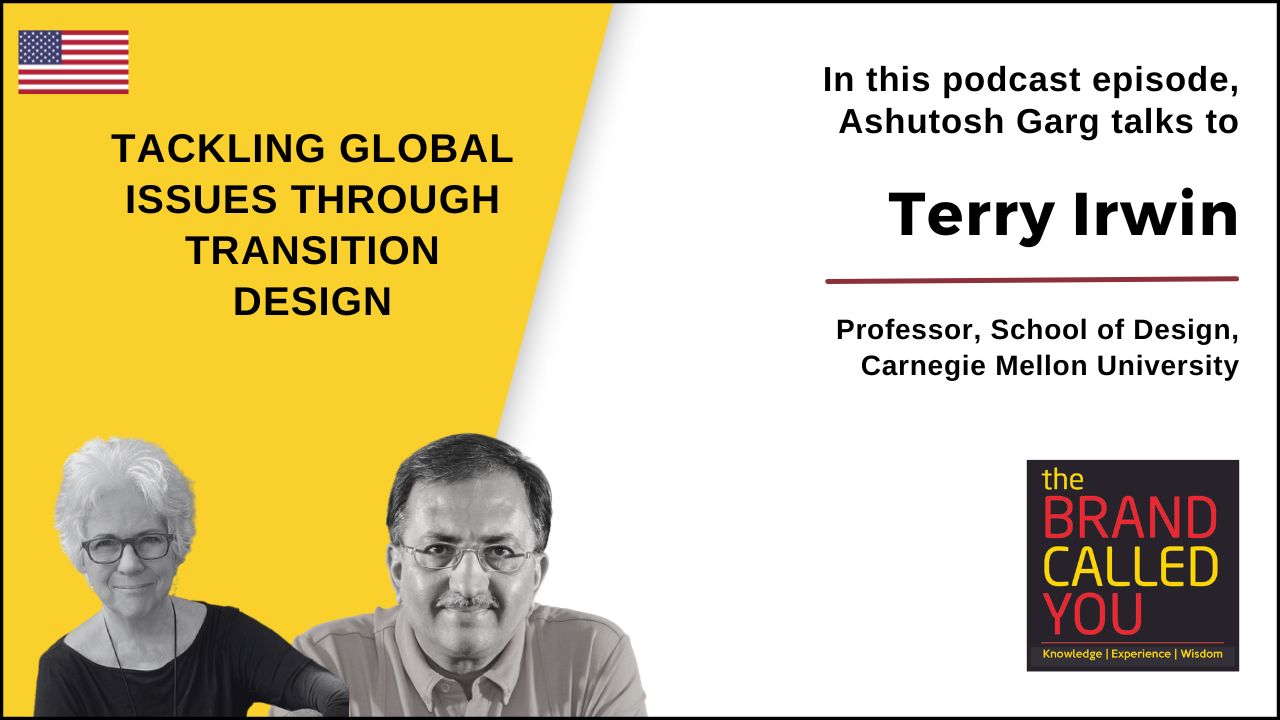Terry Irwin | Professor, School of Design, Carnegie Mellon University
- Terry is a Professor at the School of Design and the Director of the Transition Design Institute at Carnegie Mellon University
- She is one of the Co-originators of Transition Design, a transdisciplinary approach to addressing the many complex and wicked problems confronting 21st-century societies.
Podcast
Overview
Design thinking has emerged as a powerful approach to tackling complex challenges, particularly those related to climate change and social issues. As explained by Terry Irwin, Professor at Carnegie Mellon University and co-originator of Transition Design, this methodology integrates transdisciplinary perspectives to address “wicked problems”—deeply interconnected global issues like climate change, polarisation, and poverty. Unlike traditional solutions, which often impose fixes, design thinking fosters systemic interventions by understanding the problem’s root causes and the specific needs of stakeholders. By fostering collaboration among diverse groups and addressing problems on multiple levels, design thinking offers a framework for creating sustainable, equitable futures that consider not just human needs but the health of the entire ecosystem.
[00:40] – About Terry Irwin
- Terry is a Professor at the School of Design and the Director of the Transition Design Institute at Carnegie Mellon University
- She is one of the Co-originators of Transition Design, a transdisciplinary approach to addressing the many complex and wicked problems confronting 21st-century societies.
[03:53] – What are the core principles of transition design?
- Transition Design is a transdisciplinary approach aimed at addressing complex and interconnected wicked problems confronting 21st-century societies.
- It integrates different stakeholder perspectives to catalyse systems-level change.
[10:00] – How does transition design integrate multiple disciplines and cultures in its approach?
- By involving experts from various fields along with stakeholders in a co-design process.
- This multi-perspectival approach ensures a holistic understanding of problems and facilitates solutions that work across different sectors and scales.
[21:51] – How do you foresee the concept of transition design evolving in the next few years?
- Transition design will evolve as an emergent property, adapting over time rather than remaining static.
- The focus is on disseminating knowledge about systems thinking and enabling future generations to address complex problems.
RESOURCES:
Learn more about Terry Irwin: LinkedIn
Enjoyed this podcast?
If you learned new insights about the role of transition design in addressing economic, environmental, and social, subscribe and share them with friends!
Love to give us 5 stars? ⭐⭐⭐⭐⭐ If you do, we’d love a review from you. Help us reach more people to keep them in the know as we talk to leaders, high achievers, and thought leaders from diverse backgrounds and nationalities. Excellence can come from anywhere; stay in the know, and hear from emergent high achievers and gurus.
Stay updated with what’s shaping the world today through the latest The Brand Called You Podcast episode. Follow us on iTunes, Spotify, and Anchor.fm.
You can find us at:
Website: www.tbcy.in
Instagram: http://bit.ly/3HO7N06
Facebook:http://bit.ly/3YzJOaD
Twitter: http://bit.ly/3wMBOXK
LinkedIn: https://www.linkedin.com/company/tbcy/
YouTube: http://bit.ly/3jmBqfq
Chingari: https://chingari.io/tbcypodcast
Josh: http://bit.ly/3WWP0nB
Thanks for listening!
Profile
- Terry is a Professor at the School of Design and the Director of the Transition Design Institute at Carnegie Mellon University
- She is one of the Co-originators of Transition Design, a transdisciplinary approach to addressing the many complex and wicked problems confronting 21st-century societies.


